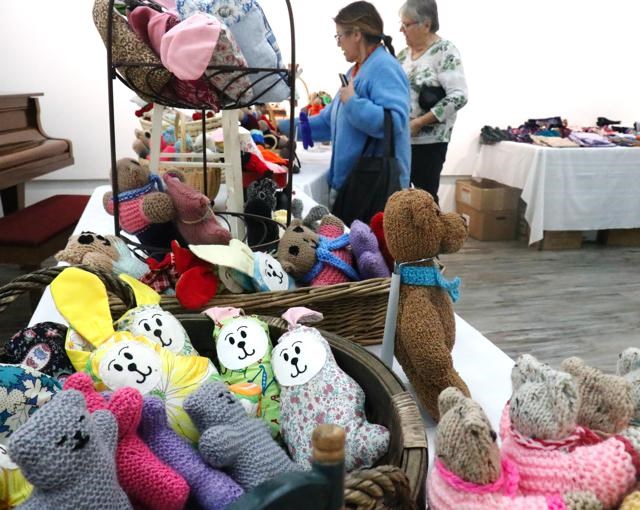A gathering of knitters, crocheters and sewers met on Wednesday afternoon at the Weyburn Public Library, with a collection of knitted teddy bears and sanitary pads for the 10th year in a row.
The gathering was organized by Khedive resident Marnie Bernard, and the bears and pads will be sent to her sister-in-law, Gail Wolters, who heads up a mission group, Canadian Nurses for Africa. Gail is a native of the Khedive area, and currently lives in Burlington, Ont., where she organizes the Canadian Nurses delegation each year.
The group of nurses head out each spring for Kenya to hold medical clinics, and while there, they hand out the knitted teddy bears and sanitary pads to women and children in the villages they visit.
“Gail’s always bringing up how wonderful Saskatchewan people are,” said Marnie, who provided some numbers about how many of the bears and pads have been sent to Kenya.
There have been 300 knitted finger puppets, and 1,900 pad sets (each with about six pads), or over 11,000 pads altogether, along 700 extra bags for the pads, and in the last three years, about 700 panties.
Since the collections began, over 2,000 knitted and crocheted bears have been sent, and in the last couple of years, about 35 reading glasses. Marnie’s brothers-in-law, Stephen and Tim Bernard, have also been sending wooden toys to Gail to take over.
Supplies of yarn and cloth are donated by individuals, and seamstresses and knitters also use materials from their personal stash. There is a group of about 15 ladies who sew the pads and bags, and another group of 15 or so knit or crochet the teddy bears.
This year there will be a group of 16 nurses going, but due to the coronavirus, or Covid-19 as it’s now known, the trip originally set for late April has been put off until the fall, said Marnie.
“They pay for their own plane fare and lodgings, so all the money they raise goes to help the people in Kenya,” she added.
To get all the bears and pads to Gail in Ontario, Vitran Express trucks them from Weyburn free of charge to Burlington, about 400 pounds worth.
In the first two years for the Canadian Nurses for Africa, the clinics they held were for six days, and after that they extended them to 10 days due to the needs that the nurses were finding in the remote villages.
A total of 66,820 patients were seen in the 10 clinics, and 138 were treated in hospital after being assessed at the clinics. They dewormed 13,456 children, treated about 5,000 people for jiggers, treated some 900 wounds and distributed 2,038 non-prescription reading glasses.
To see more information about what Canadian Nurses for Africa is doing, check out their website at www.canadiannursesforafrica.ca.




